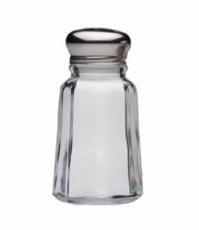
Posts Tagged: Judith Stern
Hold the salt? Not so fast, say nutrition experts

In November, Judith Stern, a professor of nutrition and internal medicine, and David McCarron, an adjunct nutrition professor, both at UC Davis, published a study in the Clinical Journal of the American Society of Nephrology that questioned the scientific logic and feasibility of broadly limiting salt intake in humans. (See journal article online.)
After examining data from sodium intake studies worldwide and a critical body of neuroscience research on sodium appetite (innate behaviors that drive us to consume salt), Stern and McCarron found compelling evidence indicating that humans naturally regulate their salt intake within a narrowly defined physiologic range. They found that Americans' average salt intake falls well within this range.
They suggest that government-led attempts to nationally control salt intake are simplistic, misguided, and not based in science and, instead, advise that individuals who are at special risk for high blood pressure and related diseases consult their physicians for nutritional advice, including appropriate levels of salt consumption.
(To view a flash video and UC Davis press release from October 2009, click here.)
Rewards might prevent post-exercise eating
The post-workout binge is so common, according to the Los Angeles Times, scientists have come up with a term for it: compensation. They are now trying to figure out what makes some people compensate while others don't.
In studies of the effects of diet and exercise on body weight, some people who lose a lot of weight, some lose very little weight and some lose none at all. That has led some scientists to believe that exercise might not be a reliable way to lose weight, the Times reported. Exercise seems to stimulate the appetite.
While compensation can be triggered by particularly intense workouts, in most people it appears to be driven by a misunderstanding of how many calories a workout actually burns, a Louisiana State University professor told Times reporter Elena Conis."People greatly overestimate how many calories they've burned," the professor was quoted in the article. "Forty-five minutes to an hour on a treadmill only burns 450 calories. You can neutralize it with one coffee and muffin at Starbucks or two glasses of wine that night."
UC Davis nutrition specialist Judith Stern offered suggestions for overcoming compensation, such as working out with a partner.
"It helps to exercise with a friend and eat together afterward, so you can be accountable to each other," Stern was quoted in the Times article. "And if control is hard for you, look for other ways to reward yourself."
The article didn't go into healthful rewards, but I found a few on About.com. Here are some calorie-free rewards for motivating exercise:
- Give yourself an extra ten minutes. At the end of your workout, use that extra time to sit in the hot tub, take an extra long shower, pick up some coffee, stretch, nap or whatever makes you feel good.
- Reward yourself every week. At the end of each week, plan something fun you'll do if you've completed all your workouts. A movie, a massage, a shopping trip, an afternoon in front of the fire, etc.
- Reward yourself every month. Plan bigger rewards for completing all your workouts in one month. A weekend trip, a new pair of running shoes, a day at the spa...choose something that makes you smile when you think about it and get moving.
- Reward yourself at the end of the season. Another way to stay motivated is to plan something for the end of a season, like a vacation. Knowing you have a vacation to look forward to will motivate you to stay in shape so you're strong and ready for your trip.

Exercise motivation can be maintained with rewards.
